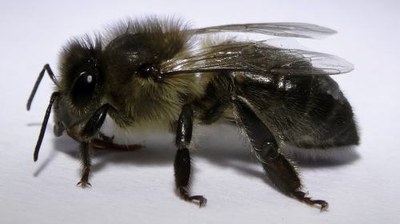SmartBees project ends after four years

A working bee of the almost extinct bee subspecies
Apis mellifera ruttneri.
Photo: Fred Zautke and LIB,
with the support of Małgorzata Bieńkowska,
Fani Hatijna, Egoitz Galarza, Borce Pavlov,
Thomas Galea, Maria Bouga, Raffaele Dall'Olio,
Adriano Siceanu.
SmartBees – the largest EU research project to date for increasing the sustainability of beekeeping with an overall budget of EUR 6 million – has now come to an end. Over a period of four years, beekeepers and scientists worked with companies from 15 EU member states and adjacent regions on improving our understanding of the threats honeybees face on our continent, developing countermeasures and protecting the intraspecific diversity of honeybees. The rich variety of European bees provides the basis for adapting to future stressors such as climate change or the emergence of new diseases.
Diversity confirmed
The first goal of the project was to ascertain the remaining diversity. Samples were accordingly analysed from over 2,200 populations from all ten bee subspecies represented on the continent. The good news: all subspecies are still present in at least residual quantities. Moreover, they can now be easily and economically determined by means of a DNA chip, which allows beekeepers who wish to work with their local subspecies to confirm the origin of their bees. In order to facilitate the apiculture of locally adapted bees, SmartBees set up a network in over ten countries. Its members were trained intensively in modern beekeeping methods. Comprehensive information material was prepared in 15 languages. For the first time, beekeepers of all European subspecies are now also able to conduct efficient breeding planning using the central apiary database beebreed.eu. They are networked in the newly founded International Honey Bee Breeding Networking (IHBBN).
Causes of losses identified
Another goal of the project was to better understand the most important causes of losses to bee populations and to curb this trend by selecting resistant bees. These factors largely concern the Varroa mite – an introduced parasite of the bee brood that transmits and furthers the spread of dangerous viruses.
Project partners from the United Kingdom were able to show that substances in the saliva of the mites contribute to the weakening of the bees’ immune system, thereby enabling the virus to propagate. As part of a collaboration between Hohen Neuendorf and partners in Denmark, it was also possible to identify bee genes that are of key importance for Varroa resistance.
The coordinator, Prof Dr Kaspar Bienefeld (Institute for Bee Research Hohen Neuendorf, Brandenburg, and the Humboldt-Universität zu Berlin) emphasises: “The SmartBees project not only provided valuable new insights that will have a sustainable, positive influence on beekeeping in Europe. SmartBees is also a great example of what synergy effects can be achieved with European cooperation in research.”
Contact
Prof Dr Kaspar Bienefeld
Institute for Bee Research Hohen Neuendorf
16540 Hohen Neuendorf
Phone: 03303/293830
Kaspar.Bienefeld@hu-berlin.de
